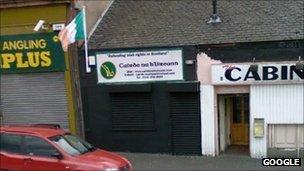'Parcel bomb' trial hears details of package
- Published

The trial heard a parcel was sent to a returns centre after it could not be delivered to Cairde na h'Eireann
The trial of two men accused of sending parcel bombs has heard details of a package sent to the offices of Irish Republican group Cairde na h'Eireann.
The High Court in Glasgow heard the package was not delivered and was sent to a returns centre in Belfast.
It was found to contain nails, a bottle of liquid, a wire and a diode.
Trevor Muirhead and Neil McKenzie deny sending parcels to Cairde na h'Eireann, Celtic manager Neil Lennon, QC Paul McBride and former MSP Trish Godman.
The court heard the first attempt to deliver the package to the Cairde na h'Eireann (Friends of Ireland) group in Glasgow's Gallowgate was on Monday 28 March last year.
The same day a suspicious package arrived at Ms Godman's constituency office in Bridge of Weir, Renfrewshire.
There were two attempts to deliver the Glasgow package but the office was closed and shuttered and the parcel was sent on to Belfast.
Package X-rayed
David McCavana, 41, head of the National Returns Centre, said the package ended up at his office.
It was X-rayed and Mr McCavana said the package was found to contain nails, wire, a bottle of liquid and a light sensitive diode.
He told the court the package was tested for chemical hazards and found to be safe. Mr McCavana said it was deemed "a hoax device, a non-viable device".
He added that the device was "most definitely" constructed to look as if it were a real device.
'Secret organisation'
Donald Findlay QC, defending Mr McKenzie, asked the Royal Mail witness how three unfranked, underpaid packages had got through the system.
The QC inquired whether police or a "more secretive organisation" could have ordered that the packages be allowed through.
"Not in my lifetime in the Post Office," Mr McCavana replied.
Advocate depute Tim Niven-Smith, prosecuting, suggested "human error" was more likely than a "secret squirrel Tufty Club".
Mr McCavana agreed with Mr Niven-Smith that it was possible one individual could have failed to frank all three packages.
He said: "We strive for perfection but don't always achieve it."
Mr McCavana added: "It could be human error."
Peroxide tests
Sgt Stephen Edwardes-Kennedy, 11 Explosive Ordnance Disposal Regiment, told the trial the package addressed to Cairde na h'Eireann tested positive for organic peroxide, which "can be used to make explosive".
The army bomb disposal expert said such explosives "can be made at home", were "hazardous" and can ignite and explode due to "friction, shock or heat".
Mr Findlay asked Sgt Edwardes-Kennedy whether he tested for peroxide, which was possibly safe, or tri-acetone tri-peroxide, which can be dangerous.
He said: "I think it's testing for peroxide-based explosive."
Sgt Edwardes-Kennedy agreed that tri-acetone tri-peroxide usually came in crystalline form but that the bottle held liquid.
The court also heard about a package addressed to Mr McBride which was found to contain a white plastic resistor and a clear plastic bottle.
The package sent to Mr Lennon at the Celtic training ground was intercepted on 26 March 2011, the package for Ms Godman was received on 28 March and the attempted delivery of the Gallowgate package was on 28 and 29 March.
Mr Muirhead, from Kilwinning, North Ayrshire, and Mr McKenzie, from Saltcoats, North Ayrshire, are charged with conspiring to assault and murder Mr Lennon, Ms Godman, Mr McBride and occupants of the Cairde na h'Eireann offices by sending them devices they believed were capable of exploding.
The trial, before Lord Turnbull, continues.
- Published28 February 2012
- Published28 February 2012